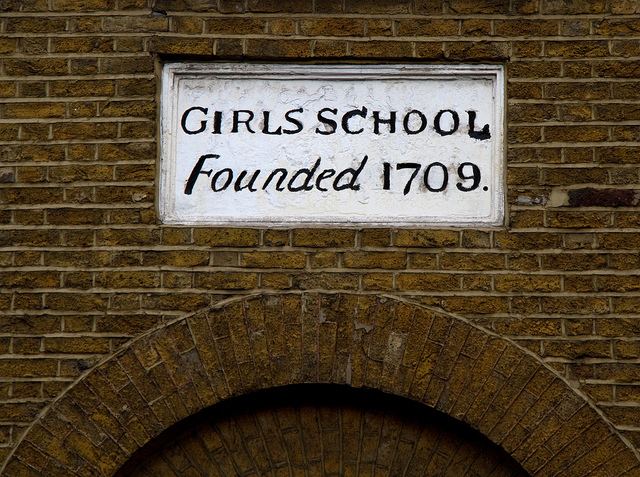Taking a step back away from the competition of the best possible education, we ask how single-sex schools impact your upbringing or gender identity.In the context of an increasingly competitive job market and students fiercely fighting it out for spots at top universities and jobs, the debate on education couldn’t be more pressing. What is the best education that parents can provide for their children, and most importantly what’s it like growing up in a single-sex school?
Young Europeans voice their opinions on the matter:
Nicoletta, 22, Italy
I only attended single-sex school for about four years when I was living in London when I was younger. I was coming from a mixed international school in Germany and not only had to adapt to British English and several other cultural differences but the single-sex school system is something I had only really ever seen in movies. At first, excited at the thought of entering a different school systems and overly excited about wearing a school uniform like in the movies, I had a very different perception of single-sex schools.
I can’t deny that I never felt inhibited to answer questions, like those that condemn mixed schools affirm, but I never felt this fear in mixed schools either. I felt a confusion as to why there was this distinct divide between genders and to what avail this separation was. At my previous school, having just undergone a severe tomboy-ish phase of playing football and cutting my hair very short, this transition to only-girl school added a certain layer of confusion. I couldn’t help but feel that some certain stereotypical notions of what “women” should be like were being imposed on us, with regular cooking, child-rearing – I kid you not – and knitting lessons. Now, whilst I understand not all schools are like this and I did make some great friends at my school and definitely learnt a lot, I can’t help but feel that certain socialised notions of femininity are imposed on you due to the fact your school’s very existence is tied to dichotomous notions of gender.
I couldn’t help but feel that some certain stereotypical notions of what “women” should be like were being imposed on us.
Oana, 22, Romania
I went to state school in Romania and as far as I know most of them are mixed. My class was from people from all backgrounds middle, “upper”, working, rural, urban, half-hungarians or slight chauvinists and boys and girls. This proved to be quite incohesive and the lack of unity would slow down the pace of our class. I think that this kind of diversity, in terms of both different genders and different backgrounds and perspectives, is really important. You eventually start going to each other’s birthday parties, sharing internal class jokes and moments and this really helps bring people together enormously.
But most importantly, you learn to perceive how complex the context you live in and how multi-sided everyone and everything is. If you are pooled together in schools of people who are perceived by society to be more similar to you, then it’s easy to fall into the trap of widening the gap between people “like you” and the others. We are probably much more alike than we think we are, and it’s important to learn to respect all different kinds of other people to learn to live together.

Chris, 26, UK
I won’t lie. I had a fantastic time at my all boys school, which I attended from the tender age of 11 up to 18. Unlike some of the well-known public schools (which in the UK are not actually ‘public’, far from it) attended by our dear Prime Minister and practically everyone in a position of power in our country, the school I attended was unpretentious and accessible. Plus, the academic standard was high and we were all pushed to achieve our best – I look at my friends now and see men in a wide range of top class professions. However, the best part was the camaraderie. There were none of the social cliques you observe in American high school movies; everybody genuinely got along. Sure, any teenage experience is fraught with tensions and insecurities but it felt by having no girls there, then one core source of these troubles was removed.
But despite all this, would I send my child to a single-sex school? The answer is a resounding no. By removing the opposite sex from schools you are essentially shielding children from real life for the benefit of their academic studies. It is no wonder then, that these children are often emotionally set-back. I can only speak from personal experience, but because girls my own age were seen rarely and never in everyday environments like classrooms or cantines, I had a tendency to put them on a pedestal. Women were mysterious and different creatures with whom you had to behave differently. I think this is part of the reason that when I got to university I didn’t spend freshers’ week sleeping around (not that I’d have been confident enough to anyway) but rather making female friends and sharing normal experiences with them. The fact that my first kiss, first girlfriend and the date I lost my virginity were probably later than the average person doesn’t bother me in the slightest. What bothers me is that there are perhaps some people that never get out of this mindset and therefore continue to believe that the opposite sex is something completely different and therefore to be treated in a separate way. School isn’t just about academic excellence but also about incubating healthy attitudes in later life.
By removing the opposite sex from schools you are essentially shielding children from real life for the benefit of their academic studies.
Mathilde, 21, France
Between 10 and 15 year-old, I attended a single-sex school. The school was created in 1913 by a women who devoted her life to young girls education. A century later, a religious community, who runs the school, still aims at promoting its initial values. Single-sex schools are not common in France. At the time, I remember sometimes complaining about the absence of male students. But with the passing years, I believe that single-sex schools have many advantages.
First, I think that teenagers are in a transition time. Relationship between boys and girls are not mature enough. From my other experiences of mixed-schools and what I heard from friends at the time, boys would often annoy girls and disturb the class. Some girls were excluded because they were judged on their appearance. In same-sex schools, appearances don’t matter. Relationships are less superficial and sincere between students. Personally, I met my best friend in that school.
Second, boys can be sometimes more expressive and virulent than girls. Mixing them in a class might prevent some girls from expressing their point of view. Studying in a single-sex school could help girls emancipate. Single-sex schools empower girls without any destabilising look from boys. This is a crucial assets for their future. I believe it is harder for a girl to situate herself in a mixed school.
Eugene, 22, Belfast, Ireland
My experience of single-sex education was a largely positive one. Belfast is well-known for being a divided city and the education system stays true to form. Most secondary schools are single sex. Certainly, nearly all of the religious schools are single sex.
This raises two problems:
1. Is it right hide boys away from girls during their formative years, then suddenly release them into the real world and expect them to function like adults? Surely growing up and interacting with the opposite sex is an education in itself?
2. And maybe more importantly, cementing religious segregation in the education system whilst promoting integration between communities surely sends a conflicting message to our children.

Luckily, I never had any problems with there being no girls: I had two sisters, a loving mother, Dad worked away from home and my grandmother practically lived with us. I loved getting into a more masculine environment. And indeed, in my school, no girls meant no distractions, that bit is true. However, it paved the way for a brutality that surely would not have been on display if girls had have been present. Being a ‘lad’ was the aim of the game and with over 1,000 students, things would regularly get out of hand. However, all things considered, my experience was overwhelmingly positive. I received a wonderful education from teachers who cared about the students and it was all done with an inclusive ethos. We had every sort – from the sons of rich businessmen to the poorest of the poor – and we were all treated the same.
The second issue, for me, is more important. Single sex, ‘faith’ schools cement a religious divide which has existed for far too long. Nevermind growing up and being unsure of how to act with women: growing up not knowing that the other side of the community is just like you and not fostering an integrated future merely feeds sectarian divides in the North of Ireland. Like it or not, this is the issue which will have to change for things to really move on.
Victoria, 21, France
In France, single-sex schools are very uncommon, and thus generally seen as a thing of the past. The Catholic school for girls I attended from the age of 11 to 18 definitely fitted this category. When asked by bewildered fellow French people how I ‘survived’ these years, my answer is always that the absence of boys was definitely at the bottom on my list of grievances against my old school (the traditional French education system being at the top, but that’s a different debate).
One argument that I constantly hear against single-sex schools is that the environment of all girls schools reinforces patriarchal values and hinders girls’ development along the same lines as boys’. My personal experience is rather of the opposite: I feel that, free from any comparison with the opposite sex, girls were free to grow and develop abilities as they wished without any gendered discourse of certain activities and capacities being more feminine or masculine than others. I don’t mean to imply that this is the case in mixed schools, I genuinely don’t think it is, but rather to reject the argument that all girls schools promote a certain idea of femininity.
However, even if I had an overall very positive experience, I don’t really see any major advantage for single-sex schools as opposed to mixed schools. Yes, a great source of distraction or fight might be removed in a single-sex environment, allowing students to focus on their studies and build strong friendships that might be reinforced by the shared experience, like I did. But other distractions are always found, and in some cases can be taken a bit too far against other students (at least where all-girls schools are concerned). If anything, evolving in this environment can for some students lead to behaviours that are quite of touch with our world. However, I realise that, in my case, it is a bit difficult to draw the line between what might result from single-sex education and from the rather conservative Catholic upbringing that was the core of this school. Nevertheless, as the very limited number of single-sex schools in France is almost exclusively made up of ‘religious’ schools, both issues are linked here.
Cover photo: Dan Brickley (Flickr); Licence: CC BY 2.0










